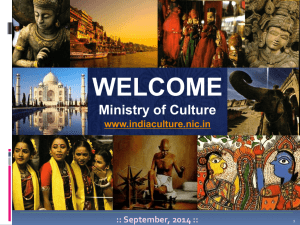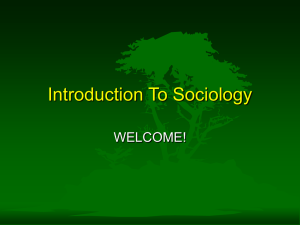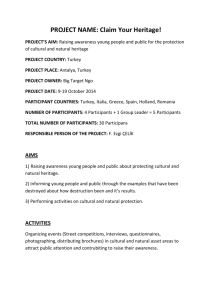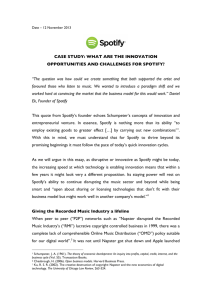Fagets / modulets titel
advertisement
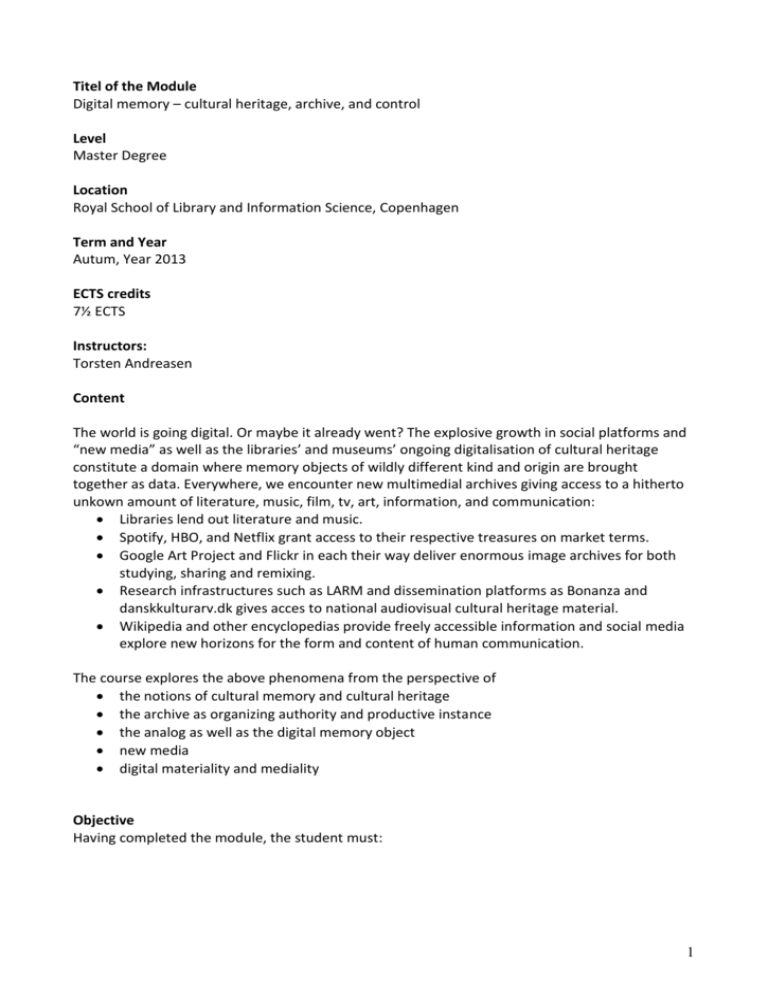
Titel of the Module Digital memory – cultural heritage, archive, and control Level Master Degree Location Royal School of Library and Information Science, Copenhagen Term and Year Autum, Year 2013 ECTS credits 7½ ECTS Instructors: Torsten Andreasen Content The world is going digital. Or maybe it already went? The explosive growth in social platforms and “new media” as well as the libraries’ and museums’ ongoing digitalisation of cultural heritage constitute a domain where memory objects of wildly different kind and origin are brought together as data. Everywhere, we encounter new multimedial archives giving access to a hitherto unkown amount of literature, music, film, tv, art, information, and communication: Libraries lend out literature and music. Spotify, HBO, and Netflix grant access to their respective treasures on market terms. Google Art Project and Flickr in each their way deliver enormous image archives for both studying, sharing and remixing. Research infrastructures such as LARM and dissemination platforms as Bonanza and danskkulturarv.dk gives acces to national audiovisual cultural heritage material. Wikipedia and other encyclopedias provide freely accessible information and social media explore new horizons for the form and content of human communication. The course explores the above phenomena from the perspective of the notions of cultural memory and cultural heritage the archive as organizing authority and productive instance the analog as well as the digital memory object new media digital materiality and mediality Objective Having completed the module, the student must: 1 Knowledge Notions of cultural heritage Notions of digital inscriptions Cultural notions of the archive Theories of cybernetics and critiques thereof Skills To reflect on the influences of digitalisation on cultural heritage To reflect on digital inscription of information To reflect on the influences of new media on cultural heritage Competences Analyse contemporary cultural heritage platforms via relevant cultural theory Analyse common media platforms such as Spotify and Netflix Analyse social media from the point of view of interaction with memory objects Forms of tuition The course will consist of classroom lectures and group discussion. Literature Ca. 750 pages Sample literature Chun, W. H. K. (2008). The Enduring Ephemeral, or the Future Is a Memory. Critical Inquiry, 35(1), 148–171. doi:10.1086/595632 Ernst, W. (2013). Digital Memory and the Archive. (J. Parikka, Ed.). University of Minnesota Press. Kirschenbaum, M. G. (2008). Mechanisms, new media and the forensic imagination. Cambridge, Mass: MIT Press. Manovich, L. (2001). The language of new media. Cambridge, Mass: MIT Press. Language English Examination All elective modules are assessed according to the 7-step grading scale with internal co-examiner The examination form is: Oral presentation of a case with material, subject chosen by the student 2 Re-exam Same as ordinary examination Marking criteria Karakteren gives i henhold til gradsopfyldelsen af målbeskrivelsen, som beskrevet i karakterskalabekendtgørelsen. The module is assessed according to the 7-point grading scale. The mark 12 is given to: For an excellent performance displaying a high level of command of all aspects of the relevant material, with no or only a few minor weaknesses Clear understanding and communication of the main theoretical points of the read texts The ability to clearly demonstrate chosen theoretical approaches with regard to a specific object of study The ability to reflect on the wider perspectives of the performed analysis with regard to the theme of the course The mark 7 is given to: For a good performance displaying good command of the relevant material but also some weaknesses An overall understanding and adequate communication of the main theoretical points of the read texts The ability to engage in a theoretical approach with regard to a specific object of study The ability to formulate the perspectives of the performed analysis with regard to the theme of the course The mark 02: For a performance meeting only the minimum requirements for acceptance A poor understanding and incoherent presentation of the main theoretical points of the read texts The inability to engange in a theoretical approach with regard to a specific object of study The inability to place the performed analysis within the horizon of the theme of the course 3




